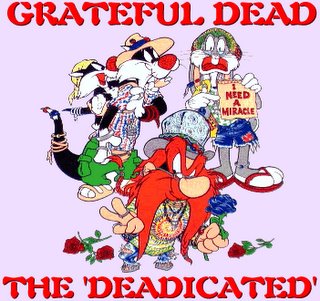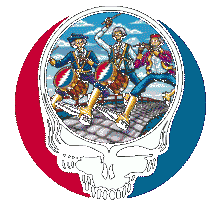And Another Download Story

This one is from Inside Bay Area:
The (other, legal) online music revolution
Taping-friendly bands allow shows to be dispersed via the Internet
By Elizabeth Jardina, STAFF WRITER
Inside Bay Area
THIS IS A STORY about online music.
It's not, however, THAT story about online music: The one where heartless fans download copyrighted work and deprive artists of their livelihoods.
It's also not the story about the 99-cent iDownload.
But it does have the allure of both — blissfully free music and the blessing of the musicians.
Too good to be true?
Not for fans of bands that allow taping.
Oh, you say: This is a story about the Grateful Dead. Yawn.
Except it's not.
It's true the Dead pioneered the idea of allowing fans to bring taping equipment to shows so they could relive their concert experiences and trade the recordings to their friends in a strictly not-for-profit way.
But taping has grown up since the advent of the Internet. Jam bands such as the now-defunct Phish, Irish singer-songwriter Damien Rice, intellectual-alternative darlings Death Cab for Cutie, and even pop acts such as Vanessa Carlton and Jason Mraz, allow their fans to tape shows — as long as the taping doesn't interfere with anybody else's concert experience.
The Internet provides an ideal distribution form, whether on fan sites or on the Internet Archive's Live Music Archive.
Tapers and concert traders don't like the word "bootleg" because it implies that there's something unseemly going on — like you had to stash your recorder in your boot.
Interest in recordings of entire concerts has spawned a wave of "official bootlegs," relatively unmastered soundboard recordings released to fans hungry for better copies of live shows.
Live Music Archive
Taping surfaced in the news last month when the Grateful Dead asked the San Francisco nonprofit, the Internet Archive's Live Music Archive (a directory of downloadable concerts by more than 1,200 bands) to remove some of its recordings.
Deadheads revolted, and eventually the Dead and the Archive came to an agreement. Audience recordings could be downloaded freely, while soundboard recordings — ones where fans were allowed to tape off the band's own sound mixing equipment -- can only be streamed, which allows fans to listen to, but not keep, the recordings.
But the conflict exposed an ongoing debate in the taping world: Does online swapping create community? What about downloading? Where does trading cross the line between community building and just greediness for more, more, more?
Grateful Dead biographer Dennis McNally says one reason the Dead originally allowed taping was so its fans would talk to each other.
"It was always perceived as a community-building exercise, and it worked that way as well," McNally says, adding, "When you have this giant box where people can hitch their computer up and download shows, that doesn't really seem to contribute that much to community."
Archiving live music
Live Music Archive volunteer curator Diana Hamilton, a research chemist from Baltimore, disagrees.
She's been trading Dead recordings online since 1996, and now puts in hours of time each week to help maintain the Archive and its discussion forums.
"I feel like I have hundreds of friends around the world, only a few I've met in person," says Hamilton, 41. "If they're in Baltimore they can come to my house for a beer, or we could meet up at a show. I don't see any difference between arranging trades on e-mail or standing in person and exchanging reel-to-reel -- or in the case of the Live Music Archive, putting your tape up for free and watching hundreds of people download it, and maybe get in touch to say thanks.
"It leads to chat on forums, which is just as much community-building as handing a reel to someone."
For love of the band
Even for a band you love, how many concert recordings can you be interested in?
Roger Wong, 32, has about 300 legal recordings of concerts by alt-country bands such as Wilco, Uncle Tupelo, the Jayhawks and Ryan Adams.
The Oakland graphic designer's interest in digitally acquiring taped concerts began when he started to get into Wilco's music about five years ago. After buying all of the band's albums, he started checking out fan sites looking for more.
"I've always been interested in live music," he says. "Any band or artist I like, I try to buy their live albums. I guess it's just hearing a different version of the song, and finding those great musical moments."
Hamilton says her experience -- and that of those she's met on sites such as www.etree.org -- is that loving one band leads to another.
She discovered Medeski Martin and Wood when one of her Phishhead friends sent her a few minutes of their music. She has since bought all their albums.
"If that can happen to me, I think of how it happens thousands of times across the world," she says.
For her, though, audience recordings don't supplant officially released live material. When the Dead started selling official recordings of their concerts, she says, "It's like the heavens opened."
Dead biographer McNally says because the Dead taping policy is so permissive, fans are especially vigilant about buying the Dead's official releases to support the music they love.
The taping and trading community in general fiercely tries to stay in the bands' good graces by upholding taping policies, including reporting bootlegs being sold on eBay to the company's legal team, explaining the no-profit rule to new traders, forbidding trading of bands that don't allow taping and not allowing trading of officially released live or studio albums.
Official bootlegs
Some bands have taken notice of fans' interest in possessing dozens -- even hundreds -- of concert recordings and are giving people what they want.
The largest-scale such effort was Pearl Jam's official bootleg series, in which the group released recordings of every concert from its 2000 and 2003 tours.
Other bands, such as Phish, Tori Amos, Ani DiFranco and Pete Townshend have or are also releasing officially sanctioned recordings of entire concerts.
RatDog, the new band of Dead co-vocalist and guitarist Bob Weir, goes a step further. It allows taping, but also sells official live recordings at the end of each concert. Fifteen minutes after the performance ends, 100 copies of the show are available for $25.
Many other acts, including everyone from the Pixies to Hall and Oates, offer similar souvenirs at their shows.
"People love it," says McNally, Rat Dog's publicist. "It's very successful, and it sounds radically better than any audience tape."
The Internet Archive's Live Music Archive, from which the public may download thousands of concerts by more than 1,200 bands, is online at www.archive.org/audio.
Lots of technical information about downloading concerts, which bands allow taping, and how to begin is available at www.etree.org.
For the non-technical, many traders still do B&P (blanks and postage) trading -- where one person sends blank CDs and postage, and the other person sends the music-filled discs back.
For more about legal online concert trading, visit furthurnet.org.
Elizabeth Jardina is a Bay Area Living staff writer. E-mail her at ejardina@sanmateocountytimes.com or call (650) 348-4327.



0 Comments:
Post a Comment
<< Home